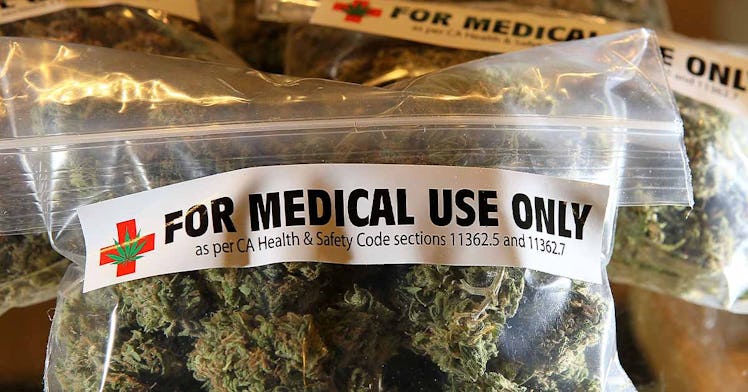How To Get A Medical Marijuana Card
Although different states have different laws, the process is pretty similar no matter where you live.

Thirty-eight states and four territories have chosen to flout the United States government’s prohibition on marijuana by legalizing the sale and consumption of cannabis for medical purposes. The FDA has only approved one marijuana-derived drug to treat two rare forms of epilepsy, but there is promising evidence that medical weed can also help those suffering from conditions including chronic pain, cancer, glaucoma, PTSD, and Parkinson’s Disease. Who’s ready to join the more than 4.3 million Americans who already have a medical marijuana card?
Not so fast. The lack of a federal framework means there are 40 separate sets of rules governing medical marijuana certification, so your path to a medical marijuana card includes some bureaucratic hoop-jumping. While some specifics vary from state to state, the general procedure for obtaining a medical marijuana card follows a pretty similar and clear path. Here’s what you need to know.
Qualifying Conditions for a Medical Marijuana Card
Qualifying diagnosable medical conditions that medical marijuana can be recommended to treat differ for each state, but there are a number of overlapping conditions. The most common (according to online cannabis marketplace Leafly) are epilepsy and seizure disorders, cancer, multiple sclerosis, HIV/AIDS, neurodegenerative diseases, cachexia, and PTSD. Nausea and pain are also common qualifying conditions, but some states only classify “severe” or “intractable” examples of the two as qualifying conditions.
Some states, like Florida, also include “medical conditions of the same kind or class as or comparable to those listed,” which gives physicians the discretion to recommend medical marijuana for serious conditions that explicitly included on the list of qualifying conditions.
Medical Recommendations for a Medical Marijuana Card
If you think your condition is a qualifying condition, the next step is to find a medical professional who will recommend cannabis. Prescribing the drug, a Schedule I substance under federal law, is a big no-no, but recommending is inbounds.
Some states will require an in-person visit to a doctor’s office and some allow for telemedicine visits. Your general practitioner might be willing to provide a recommendation, but in most states, there are clinics that market themselves (with varying degrees of subtlety) as places to get medical marijuana recommendations.
Register for a Medical Marijuana Card With Your State
Once you have a recommendation, you can provide it to your state as part of the application process. Some states provide a temporary card that, when presented with a state ID card or driver’s license, can be used at a dispensary. Others will make you wait until you receive the card in the mail.
Some states will also allow you to register one or two caregivers as part of your application. They’ll need to complete some paperwork themselves, but once approved they can buy medical marijuana for the patient, something that’s particularly useful for people whose conditions make it difficult for them to leave the house.
What to Do Once You Have a Medical Marijuana Card
A medical marijuana card will allow you to purchase medical marijuana products in limited quantities from licensed dispensaries in your state, some of which offer home delivery. Some states allow you to grow limited quantities of your own while eleven states and Washington, DC, allow purchases in their dispensaries from holders of out-of-state medical marijuana cards, a nice perk if you find yourself in need while away from home.
Among the prohibitions that are universal across states are giving medical marijuana to someone else and purchasing it from anywhere but a licensed dispensary. Additionally, the federal government still has legal authority over interstate commerce, so transporting marijuana across state lines — even if both have legalized it — is illegal under federal law.
Budtenders — employees of dispensaries — are good sources of information, as being well-versed in the laws of their state is a condition of their employment. Otherwise, the best way to look at the laws that govern marijuana in your state is probably to Google “[state name] medical marijuana qualifying conditions.” Avoid the 420.biz-style results you’ll also find and click on the official state website (e.g. ny.gov or mn.us) for the real dope.
This article was originally published on